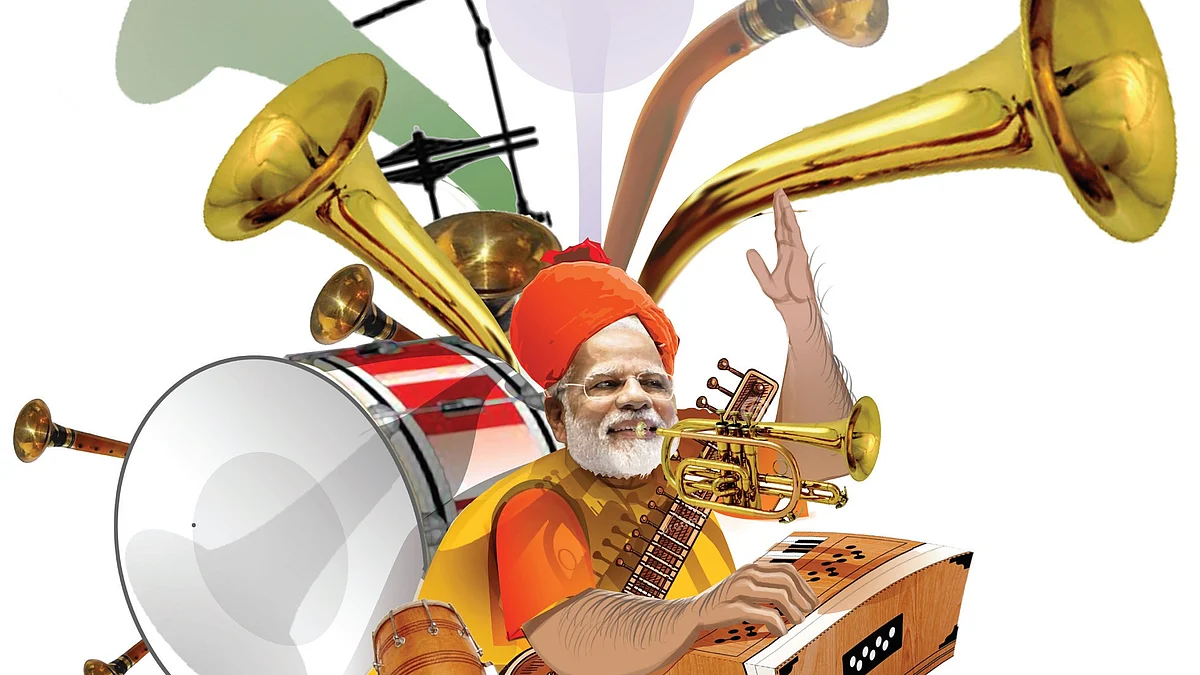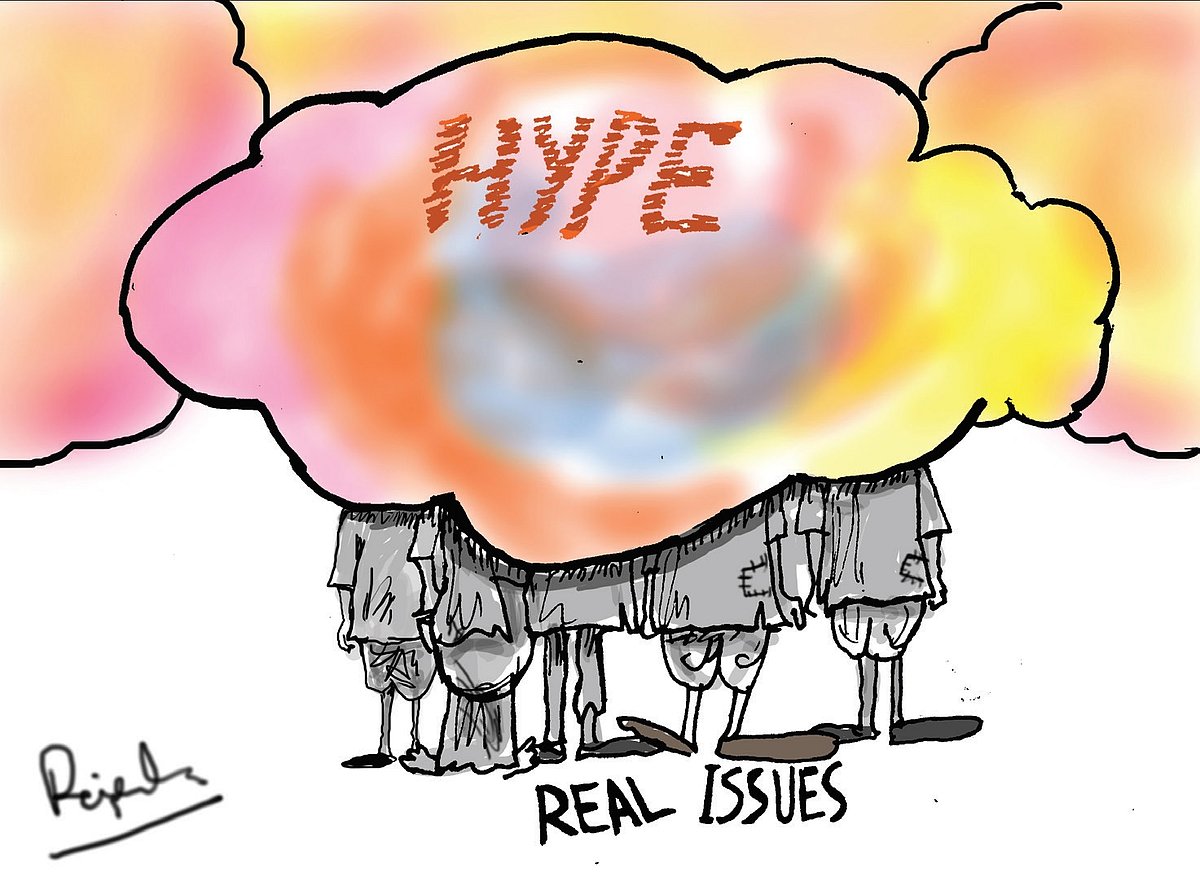India votes for Modi’s ‘idea of India’ : Where did the opposition lose the plot ?
Unemployment is up, rural wages are down, savings are declining, financial sector problems persist, trade imbalances are worsening but nothing mattered to the voter this time

Dinosaurs like me were naïve in believing that India would not accept a ‘President’, a ruler or a dictator. Democracy, we believed, had taken deep roots and the voters were mature enough to see where their interest lay. Only Yogendra Yadav was categorical in stating, long before the Exit Polls, that the BJP would be returning with an unprecedented majority. This is as good a time as any to acknowledge that he was right and armchair writers like me were wrong.
Yadav was not the only one though. Dr Parveen Patil, a psephologist, has been tweeting for weeks that there was a strong Modi wave sweeping the North, West and the eastern parts of India. The ‘libtards’ were in for a rude surprise, he had predicted. Even Anant Goenka, director of the Indian Express, in an op-ed piece on the morning of May 23 seemed to be certain of the result while patronisingly advising the Congress to re-invent itself.
Also, barely days before May 23, Kapil Komireddy, whose book ‘ Malevolent Republic: A Short History of the New India’ is being published this month, in an essay in The Guardian, noted the strong Hindu nationalism that was pumping up both the educated and the less educated alike. The two following paragraphs from his brilliant essay are particularly revealing:
“Why must Hindus bear the burden of secularism?” a Bengali voter asked me furiously. Decrying it as a suicidal attitude that comes naturally to Hindus, another voter in Bangalore told me that “secularism” would result in Hindus being “outbred and ruled over” by Muslims.”

“Modi has failed us, yes, but he has at least put Muslims in their place. Writing about Algerian independence, Raymond Aron called it a “denial of the experience of our century to suppose that men will sacrifice their passions to their interests”. Modi, unable to enhance the lives of people, has meticulously incited their passions.”
In a Dehradun bar, a girl from Welham asks me a question. She has a Muslim boyfriend but they’re thinking of breaking up. It’s too complicated, for both of them. “Do you think my parents will have less of a problem if I marry a Christian?” she wonders aloud.
There were other straws in the wind which I refused to accept as the rule rather than an exception. In a perceptive piece in The First Post, Palash Krishna Mehrotra described his encounter with two Modi supporters: “Nitesh and Ansari are Modi supporters. The fact of their unemployment does not rankle them. Nitesh hails from the same part of Bihar as Kanhaiya. Ansari is from Chhapra. I am a fan of Kanhaiya and I tried to make one out of Nitesh. I tried to change the narrative, in not just his language, but his dialect. He walked off after five minutes of watching Kanhaiya, calling him a ‘ch***ya’.”
“Nitesh is not on WhatsApp, but he watches Hindi news channels 24/7. They are full of glowing admiration for Modi. So is Nitesh. He was thrilled when Modi announced the Rs 6,000-a-year direct transfer scheme for farmers. He turned to Ansari and said: “Chalo yaar Ansari, let’s go back to the village and get registered as farmers. Arre kuch to ayega jeb main.”
Indeed, friends like Partha Banerjee in Kolkata and former colleagues like Yoginder Gupta in Chandigarh were recounting similar tales of people they encountered from Bihar and Uttar Pradesh. They had migrated from their states and were working in Calcutta and Chandigarh. They were not happy with the kind of development happening back home. But they were glowing in their admiration for Narendra Modi.
The carpenter from Bihar that Partha wrote about was dissatisfied with high prices, declining opportunities etc. But he did not blame the Government or Modi. Indeed, he did not think the Government had any role to play. But he brightened up while talking of the air strike inside Pakistan and puffed up while recalling how one warning from Narendra Modi had forced a shivering Imran Khan to send back Wing Commander Abhinandan.
The gardener from Uttar Pradesh that Yoginder Gupta spoke to in Chandigarh, claimed that his zero balance Jan Dhan Account had received out of the blue a cash deposit of Rs 30,000. His father in the village, he claimed, had also received a sum of three and a half lakh Rupees to build a house. Not surprisingly, he believed Modi and despised people who blamed him for not fulfilling his poll promises.
When the Kisan Samman Nidhi was announced in the unusual sixth budget of the Modi Government, instead of a Vote-on-Account, in February, it amounted to a brazen use of public funds, to put it bluntly, to buy votes. But such Constitutional niceties did not matter to people who actually received the amount in their bank accounts, with the promise of more to come.
People continued to point out that BJP was reaping the harvest of some well thought-out populist schemes like the Ujjwala Yojana, Swachh Bharat etc. but I was lulled by reading that toilets were not being used because of the unavailability of water, that village women had gone back to firewood because they could not afford to buy gas cylinders.
Like Komireddy, I would also like to believe that Modi having failed to fulfil his promises and having failed to uplift the lives of the people, banked on rousing passion.
I am reminded of a friend who is no more. Dr Vinayan, as he was known, was an Arya Samaji who was involved with the JP Movement and was an accused in the Baroda Dynamite case during Emergency. He sought the help of a Naxalite faction to protect villagers working with him and opposing state repression. But he fell foul of them because he disagreed with their armed actions and reliance on violence. Essentially a Gandhian, he would say that violence tended to be counter productive. But that is a long and different story.
I remember Vinayan saying that Indians liked to look up to a ruler, a King. A King who would protect them, ensure their security and lead them in adversity. And the King, he had added, could do no wrong as long as he performed the duties of a ruler. He could choose any woman he liked to be his concubine. He could lead a lavish life even while his subjects starved but as long he exuded strength and appeared to be fair, he would be accepted as a ruler.
Vinayan had added that Indians liked their ruler to tower over others, be extravagant and behave imperially. “A Rajah in the Indian context cannot behave like a other worldly saint,” were his words. And as we absorb the spectacular victory of the BJP in the election, I am reminded of his words. He died before the turn of the century and missed observing the march of Narendra Modi in Gujarat and now in the rest of the country barring the South, at least for the time being.
There is little doubt that the BJP reaped the benefits of building up a personality cult around Narendra Modi. He led a presidential campaign. People were called upon to vote for him. And the BJP rarely missed an opportunity to rub the point home, namely that the opposition had no prime ministerial candidate of its own. ‘Modi Nahin Toh Kaun’ (If not Modi, then who?) was a question that was asked incessantly and drilled into the minds of the people.
Rahul Gandhi’s alibi that in a parliamentary democracy people don’t elect a ruler or a president but members of Parliament, who in turn elect a leader as the PM, did not sound convincing enough to a people who waited for a ‘strong leader’, a Rajarshi ( a saintly King), a wise sage.
Modi’s ‘Mann Ki Baat’, the carefully choreographed monthly radio talk for which the PMO would work overtime to identify issues and villagers that Modi could refer by name, helped him to establish a connect that many of us commentators possibly underestimated. Namo App, Namo TV, MyGov.in, text messages, audio clips, WhatsApp, films, TV clips were all used extensively to build up the Modi persona, of a super leader who is on ‘Tu Tarak’ terms with world leaders like Barack Obama.
Simultaneously, the BJP sustained a relentless campaign to mock the opposition and discredit their leaders. In the end, it seemed to have worked far more effectively than even the BJP would have expected. Nobody was spared and no quarter was given. Leaders like Rahul Gandhi, Mayawati, Mamata Banerjee, Akhilesh Yadav or Sharad Pawar were all ‘old establishment’ and corrupt. They were out on bail and would be sent to jail if Modi returned—was a message that played for the last five years. Destroying the credibility of the opposition—even as the BJP introduced the hugely opaque and problematic Electoral Bonds—was meticulously planned and ruthlessly executed.
The BJP and Modi have, of course, been helped immeasurably by Television channels. The Modi Government appears to have bought their loyalty with a massive dose of advertisements that no channel could or indeed would turn down. Few hard questions were asked by the media. They willingly accepted scripted interviews with the Prime Minister and the BJP president. And they unquestioningly accepted the Government’s narrative on Rafale deal, on Agusta Westland, on Bank NPA’s, on the farm crisis and rural distress, on the GDP and suppression of data. And rather than speak Truth to power, they incessantly questioned the opposition and helped in the build-up of Modi, the moderniser.
It now needs to be acknowledged that Pakistan and the air strike at Balakot helped build an aura of nationalism around Modi. BJP’s campaign centred around Balakot following the terror attack at Pulwama. BJP leaders made no bones about campaigning on the strength of ‘Modi’s Sena’ and ‘martyrs’ of Pulwama. ‘Ghar me Ghus Kar maara’ became the narrative.
‘Statements like Badla lena meri fitrat hai’ (To take revenge is my nature) by the Prime Minister became talking points.
The PM in fact called upon first time voters to cast their ballot in memory of the martyrs to honour the Indian Air Force personnel who participated in the air strike. The opposition, which decided against politicising Pulwama, lost a strategic advantage by not going on the offensive and blaming the Government for ‘ Intelligence Failure’. It allowed Modi to wrest the initiative with the air strike. And when the opposition finally began raising questions on how the RDX reached Pulwama, why air transport was denied to the CRPF jawans, etc., the momentum was lost.
When a few feeble voices were raised, the BJP and Modi reacted with righteous indignation and painted all such questioners and doubting Thomases as traitors. The opposition was effectively painted as ‘anti-national’. The battle, it would seem in hindsight, was lost the day 44 CRPF jawans lost their lives.
Follow us on: Facebook, Twitter, Google News, Instagram
Join our official telegram channel (@nationalherald) and stay updated with the latest headlines
